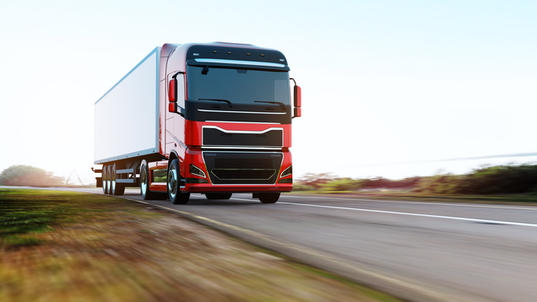The EU needs to show leadership for the sake of the climate and the bloc’s future competitiveness by ensuring all new freight trucks are zero-emissions from 2035, a broad business coalition of 44 companies says. In a letter to the EU Commission, signed by globally recognised brands including Siemens, Maersk, Unilever and PepsiCo, the coalition writes that the 2035 deadline is not just feasible but necessary to fully replace the fossil-powered truck fleet in time for the EU to reach climate neutrality by 2050.
A 2035 zero-emissions target for new freight trucks would provide investment certainty for vehicle manufacturers to increase their electric and green hydrogen offerings, the companies write. Major truckmakers have already announced that half of their sales will be zero emission by 2030 but binding rules are needed to ensure that investments and the ramp-up of supply happen on time. The coalition says some niche vehicle categories, such as construction trucks, could be given until 2040 to comply. The EU Commission will publish its proposal for new truck CO2 targets in the coming months.
“We support the European Commission’s leadership on moving away from fossil-powered trucks to clean zero emission alternatives which will not only ensure alignment with EU and international climate goals but support Europe's future industrial competitiveness. The members of our EV100+ initiative are leading the way by committing to switch their international fleets of the heaviest ICE vehicles to zero emission by 2040. A clear target on the phase-out of sales of ICE MHDVs by 2035 will accelerate market development by providing investment certainty for all stakeholders.”
“We support the European Commission’s leadership on moving away from fossil-powered trucks to clean zero emission alternatives which will not only ensure alignment with EU and international climate goals but support Europe's future industrial competitiveness. The members of our EV100+ initiative are leading the way by committing to switch their international fleets of the heaviest ICE vehicles to zero emission by 2040. A clear target on the phase-out of sales of ICE MHDVs by 2035 will accelerate market development by providing investment certainty for all stakeholders.”
But higher CO2 reduction targets for truckmakers of -30% in 2027 and -65% in 2030 will also be needed to ensure that the supply of cleaner trucks ramps up in the second half of this decade, the companies write. They say the EU Commission should resist calls for fuel credits to be included in the truck CO2 targets as they would not help solve the emissions problem of heavy-duty vehicles and would mix different types of laws, undermining their effectiveness.
“Decarbonizing our logistics is crucial to reach our 2039 net zero goal. As a cargo owner, we’ve made some great progress on limiting our emissions through critical efficiencies and reducing how many trucks we have on the road, but as an industry we can do more. Together with our EV100+ partners, we’re sending a powerful signal to the European Commission, and the wider industry, to set all new freight trucks on a path to zero emissions from 2035 onwards. The solutions to decarbonization are already here – but we need to scale up the supply of clean trucks.”
“Decarbonizing our logistics is crucial to reach our 2039 net zero goal. As a cargo owner, we’ve made some great progress on limiting our emissions through critical efficiencies and reducing how many trucks we have on the road, but as an industry we can do more. Together with our EV100+ partners, we’re sending a powerful signal to the European Commission, and the wider industry, to set all new freight trucks on a path to zero emissions from 2035 onwards. The solutions to decarbonization are already here – but we need to scale up the supply of clean trucks.”
The companies also call on EU lawmakers to finalise ambitious charging and refuelling infrastructure targets – under the Alternative Fuels Infrastructure Regulation – as fast as possible. A review of the law in 2024 should ensure the targets are in line with the expected market uptake of electric and hydrogen trucks, they say. Targeted financial support will also be needed for early adopters and SMEs to meet what are still, for now, higher purchasing costs for zero-emissions trucks.
“Decarbonising heavy transportation by 2035 is realistic but it requires ambitious decisions and significant investment. With the first of DFDS’ 125 electric trucks in operation and the remaining to come in 2023, we are seeing our investments turn into action. However, challenges will remain without a speedy deployment of charging infrastructures and refuelling infrastructure. To succeed in this transition, we need an ambitious target on zero emissions trucks by 2035 and sufficient, timely electrical grid capacity.
“Decarbonising heavy transportation by 2035 is realistic but it requires ambitious decisions and significant investment. With the first of DFDS’ 125 electric trucks in operation and the remaining to come in 2023, we are seeing our investments turn into action. However, challenges will remain without a speedy deployment of charging infrastructures and refuelling infrastructure. To succeed in this transition, we need an ambitious target on zero emissions trucks by 2035 and sufficient, timely electrical grid capacity.
Trucks account for just 2% of the vehicles on the road but are responsible for more than a quarter of EU road transport CO2 emissions. Road transport and heavy-duty vehicles are also one of largest sources of particulate matter (PM) and nitrogen oxides (NOx) pollution, which cause an estimated 350,000 premature deaths per year in the EU.

